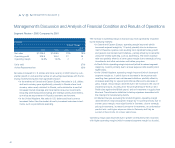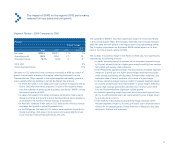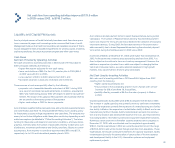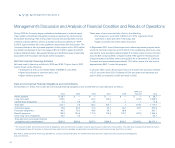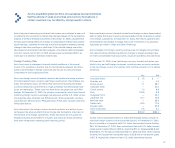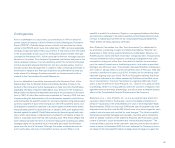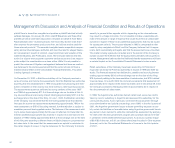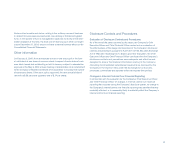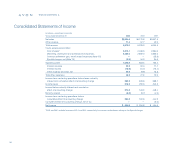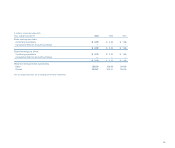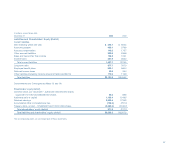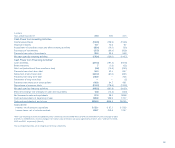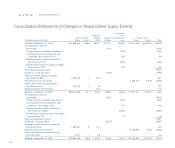Avon 2003 Annual Report Download - page 31
Download and view the complete annual report
Please find page 31 of the 2003 Avon annual report below. You can navigate through the pages in the report by either clicking on the pages listed below, or by using the keyword search tool below to find specific information within the annual report.
Management’s Discussion and Analysis of Financial Condition and Results of Operations
management’s discussion
plaintiff time to amend her complaint and produce a plaintiff who had actually
suffered damages. On January 23, 2004, plaintiff Blakemore and three other
plaintiffs served an amended class action complaint on behalf of Avon Sales
Representatives who “received products from Avon they did not order, there-
after returned the unordered products to Avon, and did not receive credit for
those returned products.” The amended complaint seeks unspecified compen-
satory and punitive damages, restitution and injunctive relief for alleged fraudu-
lent concealment, breach of contract, unjust enrichment and violation of the
California Business and Professions Code. The Company believes that this
action is a dispute over purported customer service issues and is an inappro-
priate subject for consideration as a class action. While it is not possible to
predict the outcome of litigation, management believes that there are meritori-
ous defenses to the claims asserted and that this action should not have a
material adverse effect on the Consolidated Financial Statements. This action
is being vigorously contested.
On December 20, 2002, a Brazilian subsidiary of the Company received a
series of excise and income tax assessments from the Brazilian tax authorities
asserting that the establishment in 1995 of separate manufacturing and distri-
bution companies in that country was done without a valid business purpose.
The assessments assert tax deficiencies during portions of the years 1997
and 1998 of approximately $71.0 at the exchange rate on the date of this fil-
ing, plus penalties and accruing interest totaling approximately $121.0 at the
exchange rate on the date of this filing. On July 1, 2003, the Brazilian subsidiary
of the Company was informed that the first-level appellate body had rejected
the basis for income tax assessments representing approximately 78% of the
total assessment, or $150.0 (including interest), but that rejection is subject to
mandatory second-level appellate review. The balance of the assessment relat-
ing to excise taxes (approximately $42.0) was not affected. On December 26,
2003 an additional assessment was received in respect of excise taxes for the
balance of 1998, totaling approximately $76.0 at the exchange rate on the date
of this filing and asserting a different theory of liability based on purported mar-
ket sales data. In the event that the assessments are upheld or reinstated in
the earlier stages of review, it may be necessary for the Company to provide
security to pursue further appeals, which, depending on the circumstances,
may result in a charge to income. It is not possible to make a reasonable esti-
mate of the amount or range of expense that could result from an unfavorable
outcome in respect of these or any additional assessments that may be issued
for subsequent periods. The structure adopted in 1995 is comparable to that
used by many companies in Brazil, and the Company believes that it is appro-
priate, both operationally and legally, and that the assessments are unfounded.
This matter is being vigorously contested and in the opinion of the Company’s
outside counsel the likelihood that the assessments ultimately will be upheld is
remote. Management believes that the likelihood that the assessments will have
a material impact on the Consolidated Financial Statements is also remote.
Polish subsidiaries of the Company have been responding to Protocols of
Inspection served by the Polish tax authorities in respect of 1999 and 2000 tax
audits. The Protocols asserted tax deficiencies, penalties and accruing interest
totaling approximately $30.0 at the exchange rate on the date of this filing:
$16.5 primarily relating to the documentation of certain sales, and $13.5 related
to excise taxes. On July 29, 2003, the Company accepted a final assessment of
approximately $.6 in respect of the excise tax matter, and on December 29, 2003
the Company accepted a final assessment of approximately $.5 in respect of
the documentation of sales matter.
In 1998, the Argentine tax authorities denied certain past excise tax credits
taken by Avon’s subsidiary in Argentina and assessed this subsidiary for the
corresponding taxes. Avon vigorously contested this assessment through
local administrative and judicial proceedings since 1998. In the third quarter of
2001, the Argentine government issued a decree permitting taxpayers to sat-
isfy certain tax liabilities on favorable terms using Argentine government bonds
as payment. Avon decided to settle this contested tax assessment by applying
for relief under this new government program and purchased bonds to tender
in settlement of the aforementioned assessment. As a result, a pretax charge
of $6.4 ($3.4 after tax, or $.01 per diluted share) was included in Other expense
(income), net in the Consolidated Statements of Income in the third quarter
of 2001.
50


